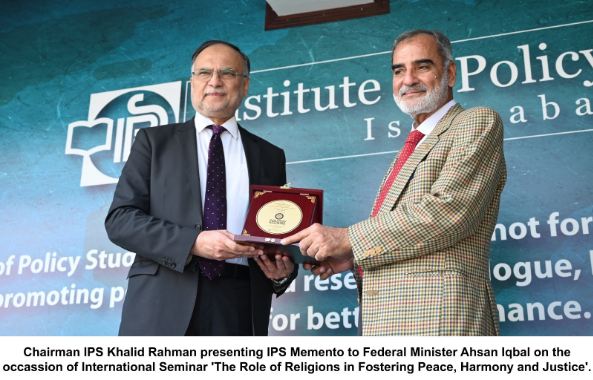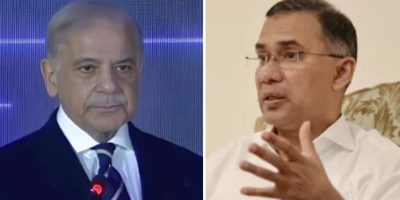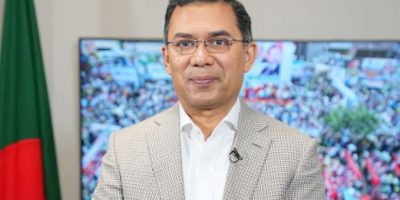Ahsan Iqbal underlines interconnection of religions, peace, and development

ISLAMABAD, DEC 4 /DNA/ – There is an inseparable link between the role of religions and peace and development, as no society can flourish without the foundations of harmony, justice, and mutual respect. This connection has global significance, with particular relevancy for Pakistan, as collective efforts are essential to bridge divides, foster inclusivity, and pave the way for sustainable development and equitable growth.
These views were shared by Ahsan Iqbal, federal minister for Planning, Development, and Special Initiatives while speaking as chief guest at the inaugural session of an international seminar, “The Role of Religions in Fostering Peace, Harmony, and Justice,” organized by the Institute of Policy Studies (IPS), Islamabad, on Wednesday. The seminar was addressed as keynote speaker by Dr Tamara Sonn, professor emerita, Georgetown University, Washington D.C., while Prof Khurshid Ahmad, founder and patron-in-chief of IPS, Khalid Rahman, chairman IPS, and Khurshid Ahmad Nadeem, chairman National Rahmatul-Lil-Aalameen Wa Khatamun Nabiyyin Authority, also spoke on the occasion.
The day-long event gathered international and local speakers, scholars, religious leaders, policymakers, and civil society to discuss religion’s transformative role in tackling humanity’s key challenges.
The seminar was held in collaboration with Allama Iqbal Open University, National University of Modern Languages, Islamabad, University of Management & Technology, Lahore, Gift University, Gujranwala, The Islamic Foundation, UK, and Markfield Institute of Higher Education, UK.
Ahsan Iqbal highlighted the enduring wisdom of faith traditions, emphasizing their universal principles of human dignity, non-violence, and compassion. Drawing on teachings from Islam, Christianity, Judaism, Hinduism, Buddhism, and Sikhism, he noted that these shared values underpin harmonious and progressive societies. However, he expressed concern over rising intolerance and hate, which fuel extremism and hinder harmony and inclusivity. He underscored the importance of fostering a narrative rooted in tolerance.
Prof Khurshid Ahmad emphasized religion’s role in addressing spiritual needs, calling it a fundamental necessity throughout history. He warned that modern civilization’s departure from religion has led to injustice, oppression, and discord. As humanity grapples with materialism, nationalism, and neocolonialism, Prof Ahmad urged faith communities to foster harmony through moral appeal rather than coercion, offering ethical guidance to counter today’s challenges. He described Islam’s principles as fostering progress, justice, and harmony.
Dr Tamara Sonn highlighted religion’s paradoxical role in conflicts, noting its unparalleled potential to resolve disputes despite often being seen at their core. She warned against religious nationalism, calling it manipulative and destabilizing, and urged societies to embrace universal values of justice, humanity, and equality. Stressing the importance of values over identities, she remarked, “It is not the faith we are born into but the values we embody that define a person’s merit.” Dr Sonn advocated interfaith collaboration through a “dialogue of action” to address shared challenges.
Khurshid Nadeem underscored religion’s enduring relevance, highlighting secularism’s failure to provide a comprehensive moral framework. He stressed that religion remains essential to addressing fundamental human needs for meaning and guidance, especially in today’s moral crises.
Khalid Rahman accentuated the decisive role of human behavior in shaping religion’s influence, emphasizing that “religions are not inherently divisive; their impact depends on how they are practiced and interpreted.” He highlighted how religion is often misused to incite violence and exclusion, overshadowing its core values of compassion and justice.
Rahman pointed out that clashes often arise not because of inherent differences but due to mismanagement of diversity, personality clashes, and competing group interests. Rahman stressed the need for inclusive strategies to resolve conflicts, bridge divides, and address socioeconomic disparities, emphasizing that humanity’s strength lies in its diversity.
Related News

Premier Shehbaz invites Bangladesh PM hopeful to Pakistan, vows stronger ties
ISLAMABAD, FEB 13: Prime Minister Shehbaz Sharif on Friday invited Bangladesh Nationalist Party (BNP) chairmanRead More

PM Shehbaz greets BNP chief on election victory
ISLAMABAD, FEB 13: /DNA/ – Prime Minister Muhammad Shehbaz Sharif spoke with Mr. Tarique Rahman,Read More


Comments are Closed